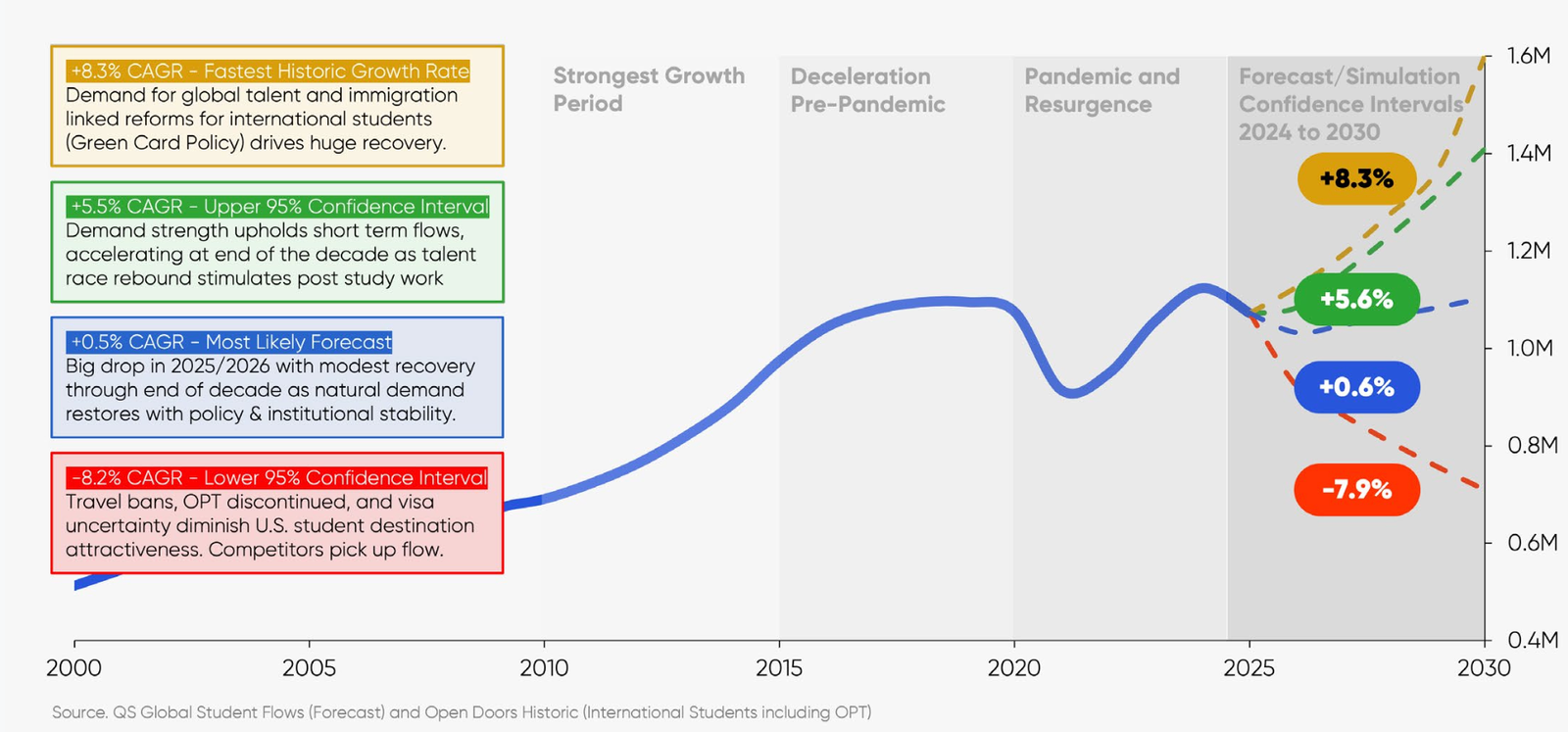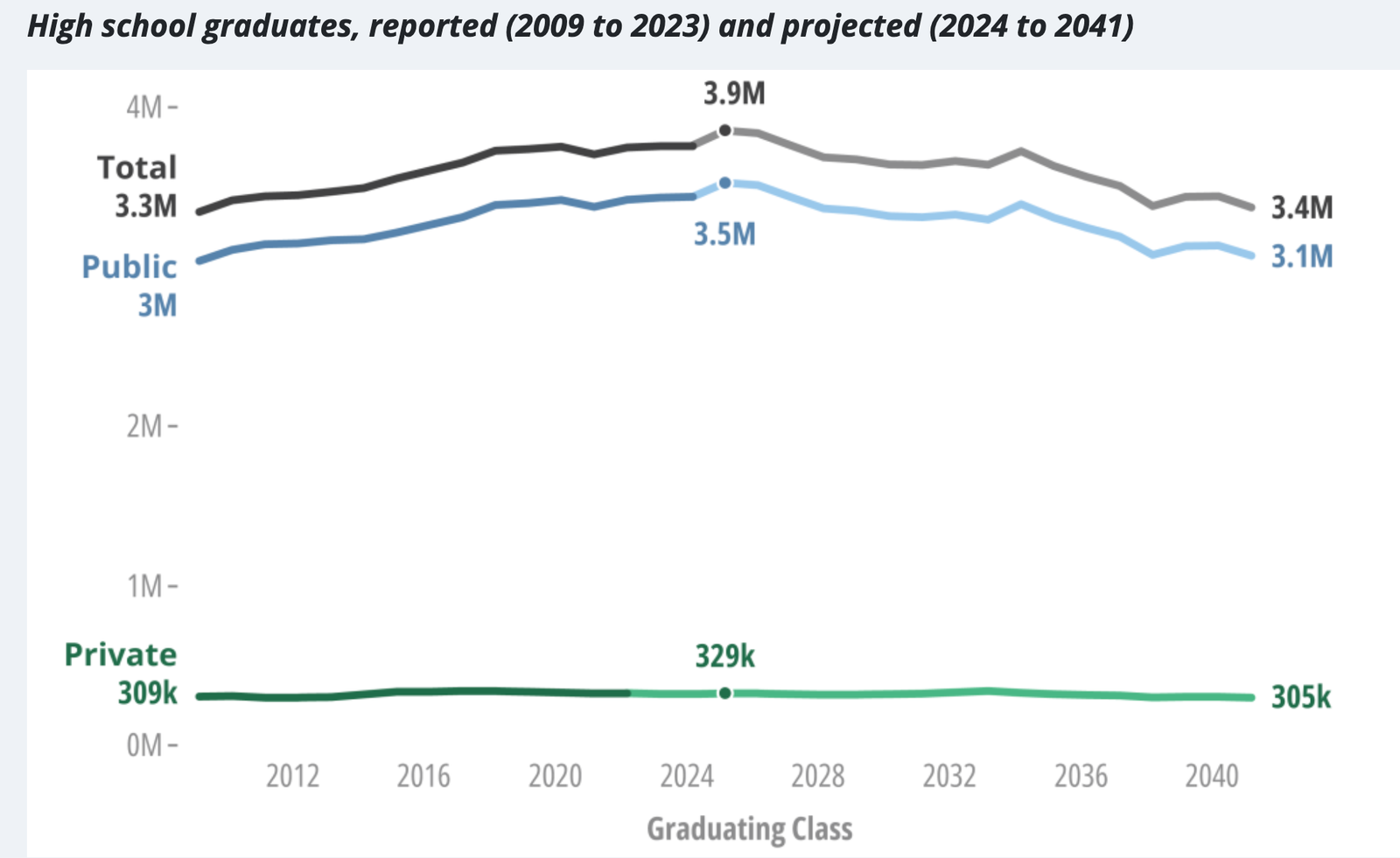The United States has long been recognized as the global leader in higher education and innovation, but its position is under growing pressure from both domestic demographics and intensifying international competition. The core question is whether America is actively competing for global talent, or simply coasting on its reputation.
The recent 2025 Global Student Flows – US Outlook report projects tremendous growth and opportunity by 2030. It is anticipated that approximately 8 million students will be seeking the opportunity to study abroad. The US is uniquely positioned to capture and benefit from a share of this growth, thanks to its unparalleled higher education capacity and research infrastructure. Yet instead of seizing this opportunity, federal policy is making it harder for students to choose the US.
US International Education Scenarios and Confidence Intervals
Total International Students in the US, 2000 through 2030F

At the same time, the domestic pipeline of students is shrinking, as we wrote about back in June. According to the Western Interstate Commission for Higher Education (WICHE), the number of US high school graduates will peak in 2025 at nearly 3.9 million, then steadily decline through 2041, with a projected 13% drop. Many colleges are already feeling the impact, laying off staff, eliminating courses, and even closing campuses. Against these headwinds, international students are not just an economic lifeline, they are a strategic necessity.

Despite this reality, recent federal actions are sending the opposite message. On August 28, 2025, the Department of Homeland Security introduced a draft regulation to replace the long-standing “duration of status” policy with a fixed four-year visa for most students, while also cutting the post-completion grace period from 60 to 30 days. This change ignores the fact that most undergraduates take five to six years to complete their degrees, and many doctoral programs extend well beyond seven years. Forcing students into repeated extension applications creates uncertainty, additional costs, and unnecessary barriers.
Meanwhile, other nations are seizing the opportunity to attract and retain international student talent. The UK offers post-study work rights and clear career pathways. Germany has expanded its English-taught programs and maintains low tuition costs. South Korea is making a concerted push to attract students in fields like artificial intelligence and robotics. These policies reflect a strategy to win the global talent race. The US, by contrast, is undermining its own competitive advantage.
The contradiction is striking. Advocates of “America First” argue that restrictive immigration and education policies protect American jobs and security. Yet the evidence points in the opposite direction. International students generate billions in economic activity, help sustain universities during demographic decline, and contribute disproportionately to America’s research, technology, and defense innovation. Excluding them does not put Americans first — it weakens the US economy, its universities, and its national security.
A bipartisan group of former national security leaders recently warned that restricting international students is a “self-inflicted injury.” Nearly half of advanced degree holders in America’s defense industrial base are foreign-born. Global talent is not a threat to American security, it is one of its greatest assets.
If the US cedes its leadership in higher education, the consequences will reverberate far beyond college campuses. It will mean fewer discoveries in American labs, fewer startups launched by foreign-born graduates, weaker diplomatic ties, and diminished influence in shaping the next generation of global leaders. In short, it will mean putting America last in the very race it once led.
The US has a choice: Embrace policies that align international education with national interests, or cling to a shortsighted “America First” ideology that undermines its own future. Global talent will go where it is welcomed. The question is whether the United States will remain that place, or watch from the sidelines as others seize the advantage.

